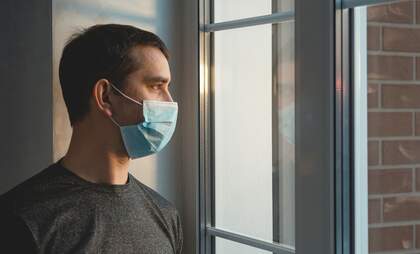Will the length of quarantine be halved for asymptomatic people?
Business leaders, the Swiss National COVID-19 Science Task Force and politicians from across the political spectrum have called on the Swiss government to halve the number of days people are required to quarantine after contracting COVID, from 10 days to five. The US has recently shortened its quarantine period for asymptomatic people, and it is hoped Switzerland will follow suit.
80.000 Swiss workers remain in quarantine or isolation
Current data from the Federal Office of Public Health (FOPH) shows that around 80.000 people are currently in isolation or quarantine, and may be unable to work. Jan-Egbert Sturm, vice-chair of the Swiss National COVID-19 Science Task Force, said this number could be reduced to 52.000 if the rules changed.
Under current rules, only close contacts of positive cases, who have been forced to quarantine, may end their isolation with a PCR or rapid test on day seven, and even then they must wear a mask outside their home at all times and stay 1,5 meters away from everyone until the 10 days is up. This does not apply to confirmed COVID cases, whose quarantine may be extended if they still exhibit symptoms two days before they are due to finish.
Balance between staff shortages and COVID spreading
Sturm spoke of a balancing act between acute staff shortages and the fear of spreading the new Omicron variant to more people. "We are trying to slow down the scale of the wave on the one hand, so as not to overwhelm our healthcare system, and on the other hand we need staff in socially important areas to maintain social cohesion," he noted.
The task force has already proposed to shorten the quarantine period by offering a COVID test on the sixth day of quarantine to asymptomatic people, which they claim makes the quarantine period just as effective, but shorter. This proposal, made in November, has fallen on deaf ears.
Vaccines and boosters make quarantine less effective
The task force calculated that a day in quarantine costs the Swiss economy 230 Swiss francs per person. Marcel Tanner, an epidemiologist in the task force, asserted, “In view of the current measures with vaccination and boosters, it has been seen that a long quarantine period does not help much."
The push by the task force to shorten quarantine has been approved by entrepreneurs and international companies. Roland A. Müller, Director of the Swiss Employers' Confederation, found that large Swiss businesses are fighting for reduced quarantine to get more people working. “We are in constant talks with the federal government about this,” he lamented.
Speaking to 20 minuten, Rudolf Minsch, Chief Economist at economiesuisse, agreed, saying, “The quarantine period of 10 days is very long and causes high costs in companies where home working is impossible." He claimed that for companies whose workers cannot work from home, like industrial workers, butchers, bakers and train drivers, there is a shortage of staff.
Politicians cite economic impact of COVID quarantine
The calls for a shortened quarantine have also made it into the halls of power. National Councillor Franziska Roth said that, "Those responsible at the federal level urgently need to shorten the quarantine period, if this does not completely contradict the epidemiological situation." National Councillor Alois Gmür said the 10 days of quarantine has been “extremely problematic”, with employees "constantly absent for long periods.”
In response, the Federal Office of Public Health (FOPH) has said it does not want to overturn the quarantine rule in its current form. Spokesperson Simone Buchmann said that the “10-day quarantine currently makes sense as Omicron is highly contagious.” However, Patrick Mathys from the FOPH said the rule was not inflexible and there were many different options for adjusting quarantine and isolation.
By clicking subscribe, you agree that we may process your information in accordance with our privacy policy. For more information, please visit this page.



COMMENTS
Leave a comment